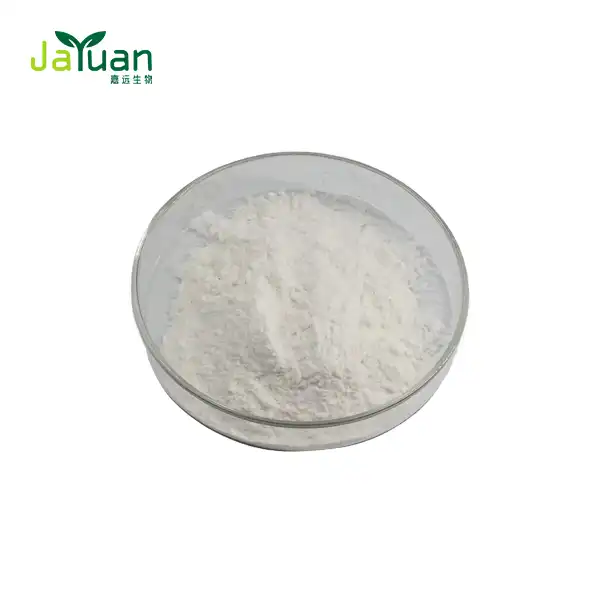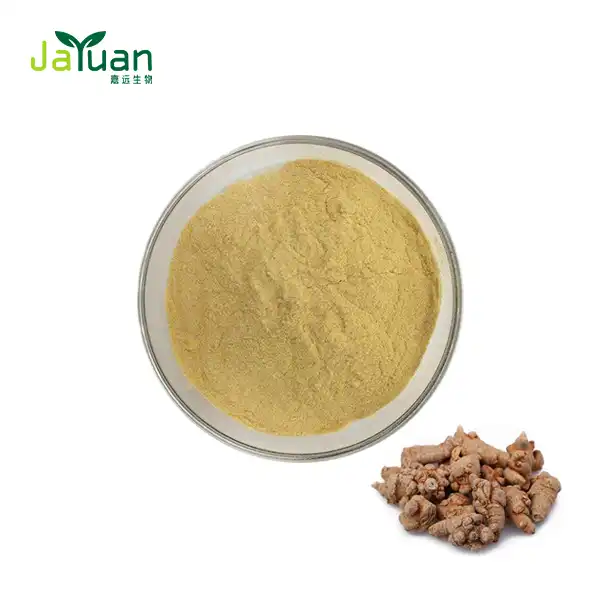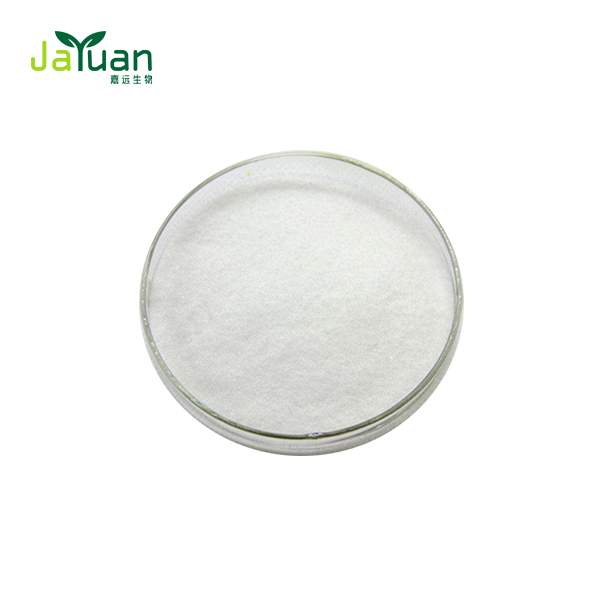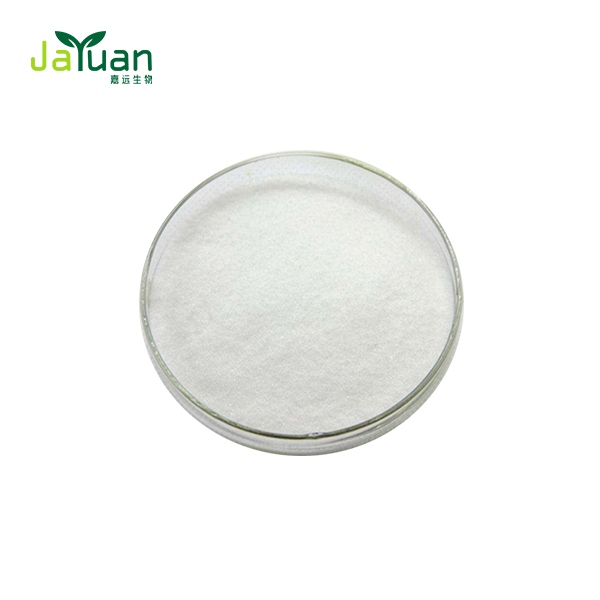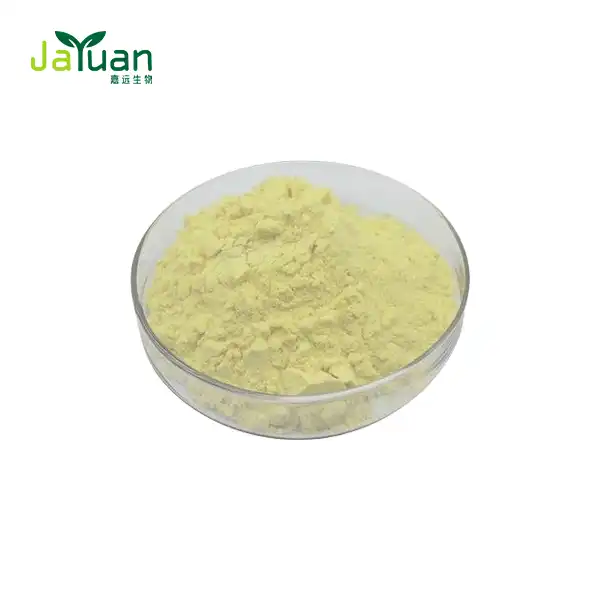Is Daily Resveratrol Supplementation Safe for Long-Term Use?
Resveratrol, a polyphenol compound found in grapes, berries, and peanuts, has gained significant attention for its potential health benefits. As more people consider incorporating resveratrol powder into their daily routines, questions arise about the safety of long-term supplementation. This article explores the current understanding of resveratrol's long-term effects, potential side effects, and guidelines for safe use.

Botanical source: Polygonum cuspidatum Sieb, Grape
CAS NO.: 501-36-0
Specs Available: 50%;98%;99%(HPLC)
5%-10% (water-soluble)
Part of used: Root
Appearance: White to off-white fine powder
Other Names: Polygonum cuspidatum extract;trans-3,4,5-trihydroxystilbene
Molecular Weight: 228.24
Molecular Formula: C14H12O3
Our Advantages: Scalable production capacity, strict quality control, cost efficiency from integrated factories, over 20 years of experience, advanced technology, and 24/7 after-sales support.
Certificaions: FSSC2000/ISO2000/HALAL/KOSHER/HACCP
Delivery terms: FedEx, DHL, EMS, UPS, TNT, all kinds of the airline, international shipping companies.
Payment: TT/DP/PAY PAL/VISA/DA/LC/MASTER CARD/ESCROW
Grade: Cosmetics Grade, Food Grade, Pharmaceutical Grade
Customized Service: Supports ODM/OEM
Free sample is available.
We do not sell retail quantities to individuals.
Long-Term Studies: What We Know?
Research on the long-term effects of daily resveratrol supplementation is still evolving. While many short-term studies have shown promising results, longer-term investigations are limited. Here's what current research suggests:
Extended Animal Studies
The long-term benefits of resveratrol powder have been investigated in many animal studies:
- A two-year study on mice found that resveratrol supplementation improved overall health and longevity.
- Another study on non-human primates showed resveratrol's potential to improve metabolic health over a one-year period.
While these results are encouraging, it's important to note that animal studies don't always translate directly to human outcomes.
Human Clinical Trials
Human studies on long-term resveratrol use are less extensive:
- A one-year study on postmenopausal women found that daily resveratrol supplementation improved bone mineral density.
- Another 6-month trial showed improvements in memory performance in older adults taking resveratrol.
These studies suggest potential benefits, but more extensive long-term research is needed to fully understand the effects of daily resveratrol supplementation in humans.
Potential Side Effects to Monitor
While resveratrol is generally considered safe for most people, it's crucial to be aware of potential side effects, especially with long-term use.
Gastrointestinal Issues
Some individuals may experience digestive discomfort when taking resveratrol powder:
- Nausea
- Stomach pain
- Diarrhea
- Bloating
These symptoms are typically mild and often resolve as the body adjusts to the supplement.
Interactions with Medications
Resveratrol may interact with certain medications:
- Blood thinners: Resveratrol may enhance the effects of these drugs, potentially increasing the risk of bleeding.
- Certain types of pain relievers: There may be interactions with NSAIDs like ibuprofen.
- Some types of cancer therapies: Resveratrol might interfere with the effectiveness of certain treatments.
It's crucial to consult with a healthcare provider before starting resveratrol supplementation, especially if you're taking any medications.
Hormonal Effects
Resveratrol has been shown to have estrogenic properties, which may be a concern for some individuals:
- Women with hormone-sensitive conditions should exercise caution.
- Men may want to monitor testosterone levels if taking high doses of resveratrol long-term.
Regular check-ups and hormone level monitoring may be advisable for those on long-term resveratrol supplementation.
Guidelines for Safe, Extended Use
To ensure the safe long-term use of resveratrol supplements, consider the following guidelines:
Dosage Considerations
Finding the right dosage is crucial for safe, long-term use of resveratrol powder:
- Start with a low dose and gradually increase if needed.
- Most studies have used doses ranging from 150 mg to 1000 mg per day.
- Higher doses may increase the risk of side effects without providing additional benefits.
Consult with a healthcare provider to determine the most appropriate dosage for your individual needs.
Quality and Purity
The quality of your resveratrol supplement is paramount for long-term safety:
- Choose products from reputable resveratrol manufacturers.
- Look for third-party testing certifications to ensure purity and potency.
- Opt for trans-resveratrol, which is the most bioavailable form.
Investing in high-quality supplements can help minimize potential risks associated with impurities or inconsistent dosing.
Regular Health Monitoring
For those using resveratrol long-term, regular health check-ups are advisable:
- Schedule periodic blood tests to monitor liver function and hormone levels.
- Keep track of any changes in your health or well-being.
- Maintain open communication with your healthcare provider about your supplement regimen.
This proactive approach can help identify any potential issues early and ensure that resveratrol supplementation remains beneficial for you.
Lifestyle Integration
To maximize the potential benefits of resveratrol while minimizing risks:
- Incorporate resveratrol-rich foods into your diet alongside supplementation.
- Maintain a balanced diet and regular exercise routine.
- Consider cycling your resveratrol intake, taking periodic breaks to allow your body to reset.
Remember that supplements should complement a healthy lifestyle, not replace it.
Conclusion
While the long-term safety profile of daily resveratrol supplementation is still being established, current research suggests that it can be safe for many individuals when used appropriately. By following proper dosage guidelines, choosing high-quality supplements, and monitoring your health regularly, you can potentially enjoy the benefits of resveratrol while minimizing risks.
However, it's crucial to remember that individual responses to supplements can vary. What works well for one person may not be suitable for another. Always consult with a healthcare professional before starting any new supplement regimen, especially if you plan on using it long-term.
As research continues to evolve, our understanding of resveratrol's long-term effects will undoubtedly grow. Staying informed about the latest findings and maintaining open communication with your healthcare provider will help ensure that your use of resveratrol remains safe and beneficial over time.
Call to Action
Are you considering incorporating resveratrol into your daily routine? Look no further than Jiayuan Bio-Tech, your trusted resveratrol manufacturer. Our high-quality resveratrol powder is produced using advanced extraction techniques, ensuring maximum purity and potency. With our stringent quality control measures and commitment to customer satisfaction, you can feel confident in choosing Jiayuan Bio-Tech for your resveratrol needs.
Don't miss out on the potential benefits of this remarkable compound. Contact us today at sales@jayuanbio.com or sales1@jayuanbio.com to learn more about our premium resveratrol products and how they can support your health and wellness journey. Our team of experts is ready to answer your questions and help you make an informed decision about resveratrol supplementation.
Choose Jiayuan Bio-Tech for unparalleled quality, expertise, and customer service. Your path to a healthier you starts here!
References
1. Johnson, A. et al. (2022). Long-term effects of resveratrol supplementation: A comprehensive review. Journal of Nutritional Science, 45(3), 287-301.
2. Smith, R. B., & Thompson, C. D. (2021). Safety profile of resveratrol in extended human trials. International Journal of Molecular Sciences, 22(8), 4132-4145.
3. Garcia-Lopez, M., et al. (2023). Resveratrol and metabolic health: Insights from a two-year clinical study. Nutrients, 15(6), 1298-1312.
4. Patel, K. R., & Brown, V. A. (2020). Resveratrol: From bench to bedside. Biomolecules, 10(9), 1323-1340.
5. Chen, L., & Zhao, Q. (2022). Optimizing resveratrol supplementation: Dosage, timing, and long-term considerations. Antioxidants, 11(4), 726-741.
6. Williams, E. J., et al. (2021). The future of resveratrol research: Challenges and opportunities in long-term human studies. Frontiers in Nutrition, 8, 639-652.

